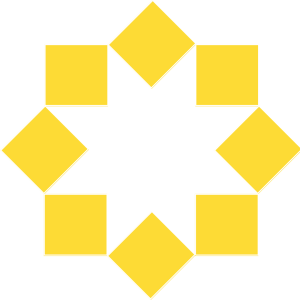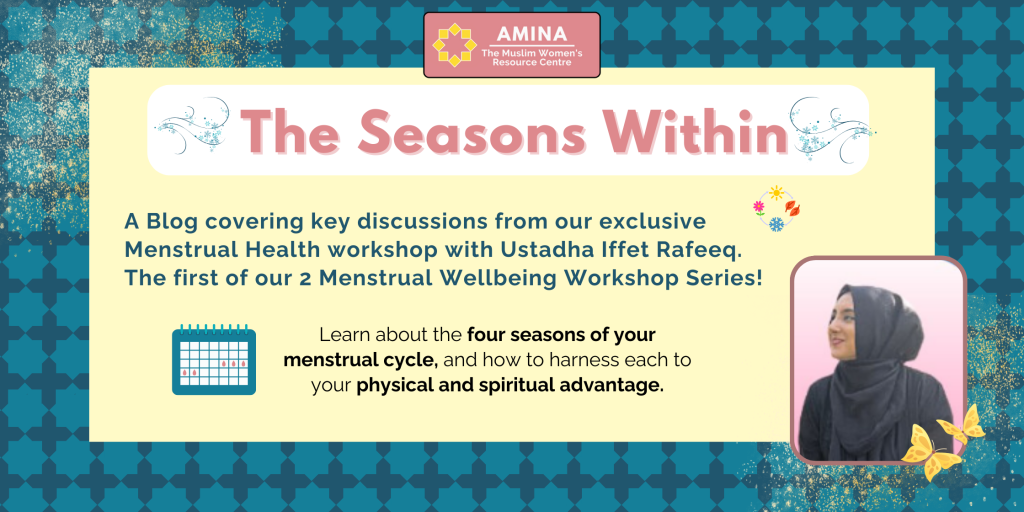
The Seasons Within with Ustadha Iffet Rafeeq

This year, Amina MWRC has hosted a series of Menstrual Wellbeing events in Glasgow. The Seasons Within was held in February, featuring Ustadha Iffet Rafeeq, founder of the Blue Lantern App. Our second session Women Embracing Change: Menopause & Spirituality, was our International Women’s Day event.
In addition to focusing on worship, Ramadan is the perfect time to focus on self-awareness and self-development. This blog post will explore key themes that arose from The Seasons Within session, with advice for women to better understand and manage their menstrual cycles. In addition to Ustadha Iffet’s teachings, the post also encompasses research that is supportive of the course content.
Understanding the Womb
In Islam, the womb is referred to as the “secure resting place” (Surah Mursalat, verse 20). The Quran commands us to be present, and conscious of the womb; the womb absorbs emotions and any unresolved pain, and we are encouraged to love and respect our wombs. Ustadha Iffet highlighted how many womb-related issues arise when women do not look after themselves, or due to unresolved trauma. The womb has a tendency to absorb such emotions, and it is scientifically proven by studies that while a woman is pregnant, the baby experiences any emotions that their mother feels. Looking after your womb does not need to be complicated – it could be as simple as having a healthy breakfast.
Making improvements in your lifestyle and diet can help you to better manage any womb-related issues. Read on to find out more about the different Seasons!
Infradian Rhythm: The Female Monthly Cycle
The Infradian Rhythm is the phrase attributed to the female monthly cycle. Women follow a 28 – 30 day clock that impacts them substantially, including through their brain chemistry, physiology, intimacy preferences, and even their dreams. The current structure of society encourages women to follow a 9 – 5 workday. However, women’s’ performance fluctuates throughout the month, based on the four seasons of the cycle. Ustadha Iffet breaks down the seasons of the womb as follows:
Spring: The Follicular Phase
The follicular phase of Spring begins on the day that your period ends and extends until you begin to ovulate. During this season, your body prepares the egg that is to be released later in the month.
During Spring, women are most cognitively sharp, often coming up with creative ideas. This phase can have you feeling light and optimistic, willing to try new things. A woman’s brain chemistry in this period allows her to focus on complex tasks. As this is the first phase of the cycle, it is the ideal time to bring changes to your lifestyle.
Physiologically, the skin thickens and pain tolerance is highest in Spring and Summer, with the body having adequate energy to engage in strenuous forms of exercise.
Summer: The Ovulatory Phase
The ovulatory phase occurs when a woman releases an egg, along with the hormone oestrogen. During this phase, women feel most energetic and healthy, with the immune system at its strongest, and metabolism at its slowest.
Women feel social and charismatic during Summer, experiencing a a surge in their confidence levels and self-image, leaving them feeling desirable with a higher libido. This season is the best phase to unleash your creative side, as you will feel highly artistic. Social skills also peak, resulting in a goal-oriented approach, forgiving attitude, and high levels of motivation.
Autumn: The Luteal Phase
The luteal phase of Autumn is divided in two parts – Early Autumn and Late Autumn. In early Autumn, women’s energy levels are slightly lower than in Summer. The body releases progesterone, a hormone with a calming effect. This helps to relax your energy, resulting in you feeling wise and organised. In Early Autumn, women are still riding on their post-summer oestrogen high, with an ability to finish off important tasks using an evaluative mindset. In late Autumn, women grow more introverted and assertive, making it the best time to have difficult conversations.
In late Autumn, progesterone levels fall, leading to irritability, brain fog, and a weakened immune system. It is crucial for women to rest in late Autumn in preparation for Winter.
Winter: The Menstrual Phase
During the menstrual phase of Winter, a woman sheds the lining of her uterus, resulting in her monthly period. For a healthy woman, this phase usually spans 5-7 days, with hormone and energy levels at their lowest. Winter is the perfect season to rest and reflect.
A healthy blood flow is ruby red in colour – brown or black discharge during your period indicates poor circulation due to stagnant blood from the previous period.
Ideal Worship in Each Phase
Spring presents a clean slate for women to renew their intentions, take ghusl (bathe), and give charity. As this phase is characterised by innovative ideas and sharp cognition, it is the ideal time to study Islamic science, register for a new course, or try to memorise new duas (prayers)or verses from the Quran.
In Summer, women crave socialising, making praying in Jamaat (Congregation) at the mosque an attractive form of worship. Due to slow metabolism, this stage is best for fasting, in addition to heavy community work, volunteering or fundraising. Daytime worship is ideal, including praying extra nawafil (optional prayers).
Autumn results in introversion and an inclination to detach from worldly affairs, leading to the potential for more inward worship. This includes engaging in charity, dua (conversations with God), and night worship, including Tahajjud prayer, and Itikaaaf (retreating).
Winter is characterised by detaching from outwardly forms of worship, and instead engaging in self-accountability or Mahasabha. This is also a time to have Quran recited to you, and to engage in Islamic research to increase your knowledge.
Diet to Regulate the Cycle
Diet is an effective way to ensure your hormones are balanced throughout the course of your seasons. Each food can either work in your favour or against you. The foods listed below are not an exhaustive list – please ensure that you do your own research to ensure you consume a well-balanced diet.
In Spring, women should have lentils, zesty and green vegetables, in addition to pickled foods, flax seeds and pumpkin seeds. A Summer diet requires the need to remove excess hormones and the consumption of omega-3 fatty acids through foods like salmon, tuna, lamb, berries, spinach, and tomatoes.
In Autumn, heating foods and herbs are ideal to prepare the body for the period flow, including cinnamon, walnuts, fish, sesame, and sunflower seeds. Women feel hungrier in Autumn, craving heavier and more nourishing foods, such as meats and broths. Try to avoid cold food and drinks as they may restrict blood flow during Winter. Finally, during the Winter period, detox foods and those rich in protein and healthy fats should be consumed to help the body recover. These foods include spinach, mushrooms, sweet potatoes, and garlic.
Hormonal Imbalances, PMS and PMDD
Hormonal imbalances can result in issues within the menstrual cycle, including period pain, a lack of period, or PMS symptoms. These symptoms can be caused by a number of factors including the following:
- Excessive stress
- Inadequate sleep
- Eating sugary or processed foods
- Excessive Caffeine intake.
Pre-Menstrual Syndrome (PMS) comprises of a number of symptoms that occur in the week before a woman’s period. PMS may include irritability, mood swings, tiredness, bloating or headaches. To help manage PMS, it is crucial to get enough hours of sleep, regular exercise, and rest.
Premenstrual Dysphoric Disorder (PMDD) refers to a more severe form of PMS that results in severe irritability, anxiety, or even depressive phases in the week before your period. Ustadha Iffet identified PMDD as an SOS call from within the body, indicating severe menstrual issues. If you suffer from PMDD, it is crucial to address these symptoms effectively. In addition to medical help, Ustadha Iffet recommended the following suggestions:
- Use of saffron as an anti-depressant
- Having Hijama (cupping) performed on the lower back and head
- Managing your stress levels
- Ensuring you get enough quality sleep
- Trying to manage your diet by synchronising with your Seasons, while eating high-protein meals
- Managing your cravings and insulin spikes by limiting caffeine and sugar intake
- Limiting screen time as it negatively impacts your endocrine system by artificially raising hormone levels.
To see improvements, consistency is key. Involve your close family members to best support your lifestyle changes.
Menopause, Childbirth, and Menstrual Care
Women must learn to treat themselves the way they wish to be treated. According to Prophetic tradition, God will keep good relations with those who keep good relations with the womb, and men are commanded to be good to the women in their lives (Sahih Bukhari: Chapter of Oneness of God).
Oftentimes, women disconnect from their wombs after giving birth, being more concerned with “doing the right thing” by tending to guests or other duties. Women also deprive themselves of the need to grieve following a loss, due to societal expectations. This is often common in BME communities where women have grown up seeing their mothers constantly overworked, with little compassion for their own selves. The results of this often show up later in life through a prolonged and difficult menopause.
Thank you to Ustadha Iffet for this enlightening session! It is crucial that we care for our own wellbeing, and learn how we can live healthy lifestyles that are mindful of our womb and menstrual cycles. To find more about her work, follow her on Instagram, or keep an eye on her paid courses. Ustadha Iffet offers the Seasons Within as a full course for women.
Amina MWRC is committed to empowering Muslim & BME Women by supporting and empowering them through a range of ways. If you are looking for someone to speak to, call our free Scottish Helpline at 0808 801 0301, Monday – Friday, 10 to 4. We offer a range of services, including financial advice,Sahara Scotland domestic abuse casework, legal visa advice, and advice from a female Islamic scholar.
We regularly host free weekly workshops in Glasgow and Dundee, in addition to our prevention of Violence Against Women and Girls Projects, and Employability Support. To find out more about our upcoming events, visit our events calendar, or follow us on social media.

